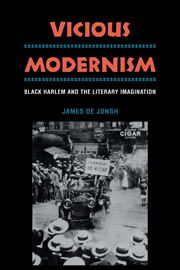Book contents
- Frontmatter
- Contents
- Acknowledgments
- Introduction: Vicious Modernism
- I The Legendary Capital: The 1920s and 1930s
- II The Emerging Ghetto: The 1940s and 1950s
- III The Inner City: The 1960s and 1970s
- Epilogue: Black Harlem and the Literary Imagination
- Appendix 1 A Checklist of Black Harlem in Poetry
- Appendix 2 A Checklist of Black Harlem in Novels
- Notes
- Index
Epilogue: Black Harlem and the Literary Imagination
Published online by Cambridge University Press: 05 February 2012
- Frontmatter
- Contents
- Acknowledgments
- Introduction: Vicious Modernism
- I The Legendary Capital: The 1920s and 1930s
- II The Emerging Ghetto: The 1940s and 1950s
- III The Inner City: The 1960s and 1970s
- Epilogue: Black Harlem and the Literary Imagination
- Appendix 1 A Checklist of Black Harlem in Poetry
- Appendix 2 A Checklist of Black Harlem in Novels
- Notes
- Index
Summary
Black Harlem in literature is an original twentieth-century topos, a modern motif created by African-American writers inspired by the fervor of the racial transformation of the Manhattan neighborhood north of Central Park and reinterpreted over the decades by writers of different races. Although the literary trope of black Harlem is indisputably a creation of the discourse of African-American literature in the United States, the coherence and continuity of the usage of the trope has evolved within the broader cultural frame of the modern Africana literatures written by authors of African racial or cultural descent in Spanish, French, and Portuguese as well as in English. From one international generation of black writers to the next, the motif has remained the avatar of an ethos of spiritual, cultural, and political renewal of peoples of African descent in the various linguistic zones of the diaspora. Additionally, the trope of black Harlem illustrates significant resonances and interrelationships with literatures outside the Africana discourse, for many writers of European and Asian as well as African descent have found the idea of Harlem to be relevant to their preoccupations and employed the figure of black Harlem in significant ways. Novels set in Harlem, with very few exceptions, have been written in English and published in the United States by authors of the different races who are American citizens or longtime residents, but poetry about Harlem has ranged widely across national and linguistic frontiers.
- Type
- Chapter
- Information
- Vicious ModernismBlack Harlem and the Literary Imagination, pp. 209 - 217Publisher: Cambridge University PressPrint publication year: 1990



